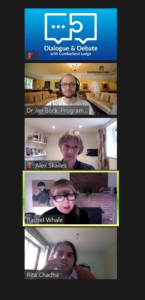On Wednesday 10 June 2020, Cumberland Lodge hosted a live webinar on How Future-Literate is the Charity Sector?, as part of the Dialogue & Debate series.
Our Programme Director, Dr Jan-Jonathan Bock, was in conversation with three guest speakers:
- Rita Chadha (CEO, Small Charities Coalition)
- Alex Skailes (Director, Cass Centre for Charity Effectiveness)
- Rachel Whale (Founder and Chief Executive, Koreo; and Founder, CharityWorks).
As a young person embarking on a career in the charity sector, I felt curious to hear about the hopes and fears of the panellists and I was armed with questions about what we can all do, on a personal and professional level, to help ensure that charities are prepared for the weeks, months and years to come.
Fears
Opening the discussion, Rachel described charities as navigating ‘a perfect storm’, in which income is stretched, demand for support from the communities they serve is rising, and there are fewer staff at work.
She pointed out that charities who support young people, the elderly, the homeless and victims of domestic abuse are particularly under pressure to deliver their services during the pandemic, and, yet, it is also vital that they keep their sights on the longer-term, to safeguard and shape that provision to meet the needs of the future. After all, it’s not just about keeping heads above water during the crisis; the charity sector also needs to transition, rebuild and look ahead to a better world.
Yet, the practical challenges of staying afloat are real. The £750 million package of support, granted to UK charities by Chancellor Rishi Sunak, will go some way to supporting them through this time, but nevertheless, a survey carried out during lockdown found that as many as one in 10 are at imminent risk of closure.
When asked about her worries for the charity sector, Alex mentioned the possibility of rising tensions between boards of trustees and executives, owing to the very difficult decisions they are having to make. She speculated that boards may, understandably, become increasingly risk-averse and questioned whether it is too late to make certain big decisions without services currently on offer now being compromised. As a new trustee of a small charity myself, this point offered some food for thought. I made a personal note to not let the economic and financial uncertainty push aside creative and ambitious decision-making. In many ways, it is more important now, than ever, to reimagine bold new futures and to avoid only measuring success by productivity and profit.
Rita expressed her fears for smaller charities who may lack the digital skills to keep up with the inevitable changes in service delivery that have been brought about by advancements in technology, and now accelerated by the impacts of COVID-19. She anticipates that charities’ digital competency will be their defining feature in terms of the ability to access funding and resources, and to manage and deliver services.
Hopes and opportunity
Yet despite these challenges, the discussion also revealed a real optimism for the future of the sector. My main takeaway from the conversation was that charity is a space for radical hope. Yes, there are challenges, but charities are mission-driven and powered by social purpose, and so their passion and care will help them to survive.
This has been particularly evident in recent months, as many charities have responded and adapted very efficiently to recent changes, thereby proving to themselves, their beneficiaries and wider society that they are capable of being agile and innovative. The pandemic has also fostered a sense of community amongst charities, in which people are increasingly sharing their learning – whether it be the good or the bad.
From my experience, this rings absolutely true. I have felt spoilt for choice, in terms of online training, webinars, podcasts and blogs and often find myself in rabbit holes on Twitter of new, accessible and inspiring content. This week alone, I have signed up to a TedTalk with Dexter Dias QC, focusing on making racial justice a reality, and a workshop about charity resilience as part of Small Charity Week. I have also been really enjoying the Young Trustee Movement’s Digital Hub. The increasing number of open resources during lockdown has brought positive opportunities for us all to learn and reflect.
Diversity
For a webinar with ‘future’ in the title, the conversation amongst panellists quite rightly moved towards the role of young people in helping to shape the sector. It was refreshing to hear about the positive work being done by many organisations – such as 2027 and Charityworks – to empower young people from all backgrounds to come and work in the sector and use their skills for the betterment of society.
It struck me that, whilst this work is really positive, there is still a lot of work to be done to ensure that leaders and decision-makers are representative of the people they serve. The #BlackLivesMatter campaign is a big wake-up call to everyone that urgent action needs to be taken to address systemic inequalities in society and to tackle institutional racism. The charity sector is no exception, and making every effort to diversify the sector and embed processes to ensure that everyone has equal opportunities to participate in dialogue and decision-making, will be crucial to making it stronger.
A volunteer spirit
Towards the end of the webinar, the live audience took part in a poll. The question asked was, ‘Have you volunteered for a charity more than you did previously, in the past three months?’ Although the sample size was relatively small, this revealed that people have been giving more of their time to good causes during the pandemic. The panellists spoke about the value of this increased contribution but also highlighted the need to ensure that systems are in place to support volunteers and encourage them to stay engaged in the future.
The crisis we are currently facing is causing so much pain, loss and sacrifice across society, but it has also certainly brought about the opportunity to reimagine a more positive future.


